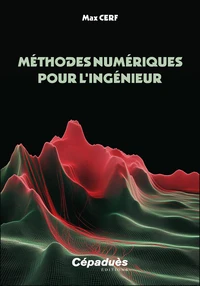Optimization Techniques. Tome 2, Discrete and Functional Optimization
Par :Formats :
- Paiement en ligne :
- Livraison à domicile ou en point Mondial Relay indisponible
- Retrait Click and Collect en magasin gratuit
- Nombre de pages464
- PrésentationBroché
- FormatGrand Format
- Poids0.845 kg
- Dimensions16,0 cm × 24,2 cm × 2,9 cm
- ISBN978-2-7598-3163-0
- EAN9782759831630
- Date de parution13/10/2023
- CollectionCurrent Natural Sciences
- ÉditeurEDP Sciences
- PréfacierEmmanuel Trélat
Résumé
This book in two volumes provides an overview of continuous, discrete and functional optimization techniques. This second volume is devoted to discrete optimization (problems with integer variables) and functional optimization (problems where the unknown is a function). The topics covered are : - mixed linear programming : cutting methods and tree methods ; - combinatorial optimization based on graphs : path, flow, assignment problems ...
; - the computation of variations based on Euler-Lagrange conditions and their extensions ; - optimal control based on the Pontryaguin maximum principle and its extensions ; - numerical methods : differential equations, direct and indirect methods. The emphasis is on understanding the principles rather than on mathematical rigor. Each concept or algorithm is accompanied by a detailed example to help you grasp the main ideas.
This book is the result of 30 years of experience and is intended for students, researchers and engineers wishing to acquire a general knowledge in the field of optimization.
; - the computation of variations based on Euler-Lagrange conditions and their extensions ; - optimal control based on the Pontryaguin maximum principle and its extensions ; - numerical methods : differential equations, direct and indirect methods. The emphasis is on understanding the principles rather than on mathematical rigor. Each concept or algorithm is accompanied by a detailed example to help you grasp the main ideas.
This book is the result of 30 years of experience and is intended for students, researchers and engineers wishing to acquire a general knowledge in the field of optimization.
This book in two volumes provides an overview of continuous, discrete and functional optimization techniques. This second volume is devoted to discrete optimization (problems with integer variables) and functional optimization (problems where the unknown is a function). The topics covered are : - mixed linear programming : cutting methods and tree methods ; - combinatorial optimization based on graphs : path, flow, assignment problems ...
; - the computation of variations based on Euler-Lagrange conditions and their extensions ; - optimal control based on the Pontryaguin maximum principle and its extensions ; - numerical methods : differential equations, direct and indirect methods. The emphasis is on understanding the principles rather than on mathematical rigor. Each concept or algorithm is accompanied by a detailed example to help you grasp the main ideas.
This book is the result of 30 years of experience and is intended for students, researchers and engineers wishing to acquire a general knowledge in the field of optimization.
; - the computation of variations based on Euler-Lagrange conditions and their extensions ; - optimal control based on the Pontryaguin maximum principle and its extensions ; - numerical methods : differential equations, direct and indirect methods. The emphasis is on understanding the principles rather than on mathematical rigor. Each concept or algorithm is accompanied by a detailed example to help you grasp the main ideas.
This book is the result of 30 years of experience and is intended for students, researchers and engineers wishing to acquire a general knowledge in the field of optimization.










